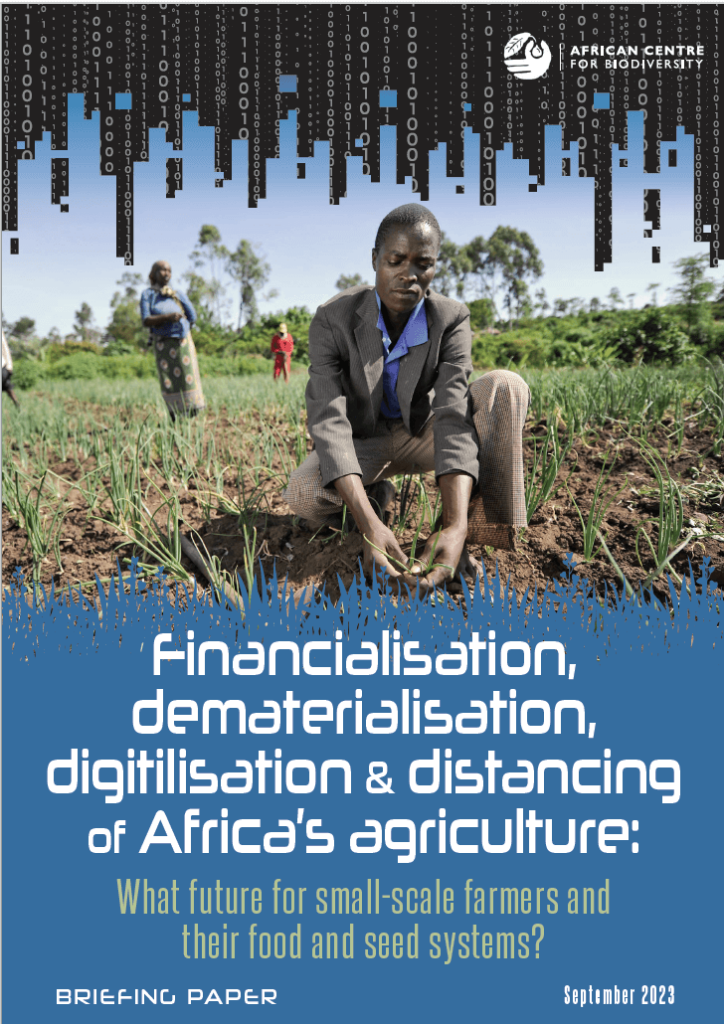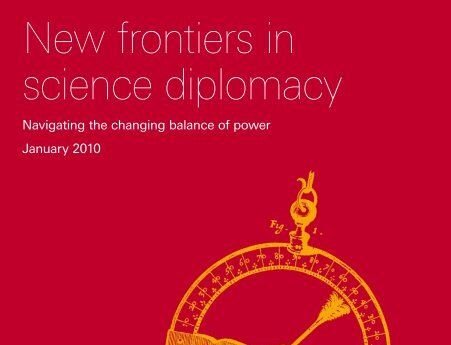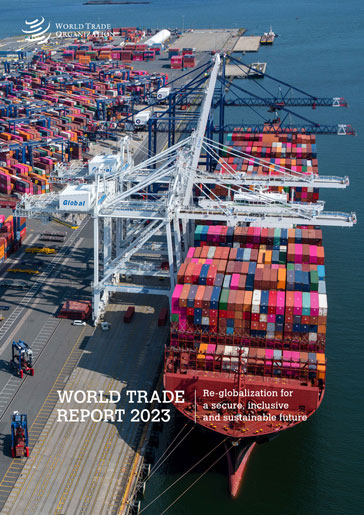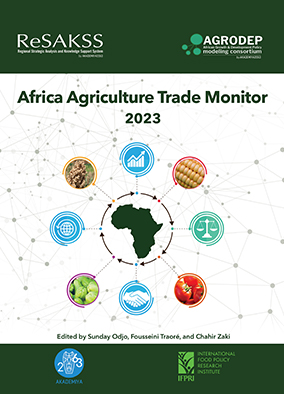FOOD SYSTEMS
ACB (2023) Financialisation, dematerialisation, digitalisation & distancing of Africa’s agriculture. What future for small-scale farmers and their food and seed systems? #25 p.The themes covered in this year’s report include: assessing the state of Africa’s food systems amidst global crises, climate-related shocks, the formulation of Sustainable Food Systems Transformation Plans, the role of the African Continental Free Trade Area (AfCFTA) in driving Africa’s food systems’ recovery, the significance of innovation and technology in food system transformation, and the exploration of Africa’s “demographic dividend” in agri-food sector transformation.
Danielle Resnick and Johan Swinnen (2023) The Political Economy of Food System Transformation - Pathways to Progress in a Polarized World. #401 p.
FARA (2023)  Gender-Mainstreaming Action Plan for Inclusive and Sustainable Food Systems in Africa #52 p.
Gender-Mainstreaming Action Plan for Inclusive and Sustainable Food Systems in Africa #52 p.
Science diplomacy seeks to strengthen
the symbiosis between the interests
and motivations of the scientifi c and
foreign policy communities. For the
former, international cooperation is
often driven by a desire to access the
best people, research facilities or new
sources of funding. For the latter,
science offers potentially useful
networks and channels of communication that can be used to support
wider policy goals.
USAID (2023)  Operationalizing USAID’s Climate Strategy to Achieve Transformative Adaptation and Mitigation in Agricultural and Food Systems # 97 p. See also: 11/09. A hybrid public meeting discussed the draft report’s main findings, targets, and recommendations with the Subcommittee, BIFAD Members, USAID representatives, and other stakeholders. Related: U.S. Government's Global Food Security Research Strategy, FY22-26 # 27 p.
Operationalizing USAID’s Climate Strategy to Achieve Transformative Adaptation and Mitigation in Agricultural and Food Systems # 97 p. See also: 11/09. A hybrid public meeting discussed the draft report’s main findings, targets, and recommendations with the Subcommittee, BIFAD Members, USAID representatives, and other stakeholders. Related: U.S. Government's Global Food Security Research Strategy, FY22-26 # 27 p.
Fazey, I and Colvin, J. (2023). Transformation: An introductory guide to fundamental change for researchers and change makers in a world of crises - A Report for the Transforming UK Food Systems SPF Programme. University of York, Emerald Network Ltd. #52 p.
Transformation: An introductory guide to fundamental change for researchers and change makers in a world of crises - A Report for the Transforming UK Food Systems SPF Programme. University of York, Emerald Network Ltd. #52 p.
The 2023 AATM calls for concerted regional- and continental-level action toward sustainable trade flows and more environment-friendly trade policies. The report also delves into the negative impacts of the Russia-Ukraine war on fertilizers and food trade and recommends action to lessen the effects of the shocks on African countries and consumers.
This book offers an interdisciplinary perspective on the political economy of nutrition, biotechnology, trade, and agricultural policies. It adopts diverse methodologies including economic modelling, qualitative case studies, and discourse analysis. And it identifies which political economy issues are cross-cutting and which are context-specific.
GENDER
 Gender-Mainstreaming Action Plan for Inclusive and Sustainable Food Systems in Africa #52 p.
Gender-Mainstreaming Action Plan for Inclusive and Sustainable Food Systems in Africa #52 p.This action plan contains measurable expected indicators of change and timeline that is in tandem with FARA Strategic Plan (2024-2028). This action plan should be read with other action plans, gender documents, policies and strategies associated with FARA and the CAADPXP4 consortium.
RESEARCH
 Operationalizing USAID’s Climate Strategy to Achieve Transformative Adaptation and Mitigation in Agricultural and Food Systems # 97 p. See also: 11/09. A hybrid public meeting discussed the draft report’s main findings, targets, and recommendations with the Subcommittee, BIFAD Members, USAID representatives, and other stakeholders. Related: U.S. Government's Global Food Security Research Strategy, FY22-26 # 27 p.
Operationalizing USAID’s Climate Strategy to Achieve Transformative Adaptation and Mitigation in Agricultural and Food Systems # 97 p. See also: 11/09. A hybrid public meeting discussed the draft report’s main findings, targets, and recommendations with the Subcommittee, BIFAD Members, USAID representatives, and other stakeholders. Related: U.S. Government's Global Food Security Research Strategy, FY22-26 # 27 p. Transformation: An introductory guide to fundamental change for researchers and change makers in a world of crises - A Report for the Transforming UK Food Systems SPF Programme. University of York, Emerald Network Ltd. #52 p.
Transformation: An introductory guide to fundamental change for researchers and change makers in a world of crises - A Report for the Transforming UK Food Systems SPF Programme. University of York, Emerald Network Ltd. #52 p.The concept of transformation is growing in relevance because of the complex nature of the challenges we face. Overcoming serious challenges, such as climate change, hunger, obesity, mental health, and inequalities, cannot be achieved by just improving what we already do. Instead, we need much deeper and more fundamental kinds of change to transcend the systems, thinking, and mindsets that have led to, and perpetuate, the challenges. Watch the recording of the presentation here.
TRADE
WTO (2023) The World Trade Report 2023 # 134 p.
The World Trade Report 2023 presents a comprehensive analysis that informs policymakers, industry leaders, and stakeholders alike. It offers a wealth of data-driven insights that will shape discussions and decisions on trade policy and strategy. See also: 12-15/09 WTO Public Forum
IFPRI & AKADEMIYA Africa Agriculture Trade Monitor (AATM) # 208 p.
CLIMATE
CITI-GPS (2022) Food Security Tackling the Current Crisis and Building Future Resilience # 80 p.This report discusses the main causes of food insecurity which include conflict, environmental challenges and social, political and economic shifts.
CITI-GPS (2022) Food and Climate Change- Creating Sustainable Food Systems for a Net Zero Future # 76 p.
CITI-GPS (2022) Food and Climate Change- Creating Sustainable Food Systems for a Net Zero Future # 76 p.
This report argues that climate change would have a devastating impact on food production affecting the most vulnerable communities.
Power Shift Africa (2023) Just Transition: A Climate, Energy and Development Vision for Africa # 92 p.
This is the11th report by the Malabo Montpellier
Panel, which convenes 18 leading experts in
agriculture, engineering, ecology, nutrition, and
food security. For African countries to improve their
preparedness, adapt to climate change, and
build resilient food systems, they will require
significant investment.
 UN Foundation (2023) Empower Climate-Resilient Smallholder Agriculture by Investing in African Research and Innovation #28 p.
UN Foundation (2023) Empower Climate-Resilient Smallholder Agriculture by Investing in African Research and Innovation #28 p.Drawing on the collective insights of fifteen African researchers and innovators, this brief recommends three strategies for more effectively investing in smallholder centered research and innovation that advance climate-resilient agriculture.







No comments:
Post a Comment